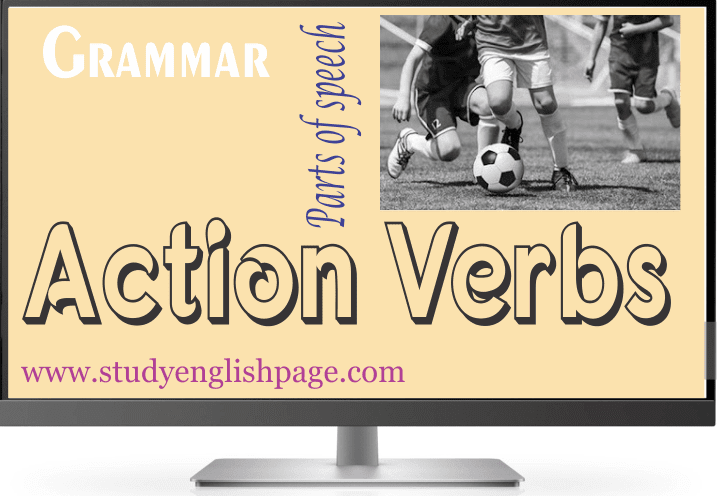Action Verbs
What are Action Verbs?
Action verb shows action that the subject performs. The action can be performed physically or mentally.
Look at the picture. You will understand.

In this picture, you can easily identify that there are some people. They are doing something. What are they doing? They are playing football.
Physical Verbs
Physical verbs are action verbs. They show actions that involve visible movements. When physical activity is performed, that can be visible and one can easily see the action.
Tiger is chasing a deer.

We see clearly in the picture that the tiger is doing something. What it is doing is visible and involves physical movements.
Mental Verbs
Mental verbs are action verbs that are related to concepts that cannot be seen. When a mental verb is performed, that cannot be visible and one cannot see the movements.
He is thinking about something strange.

As we see in the picture he is doing something. The action he is performing is not visible. We cannot see the action he is performing. We just discover that he is doing something conceptually.
Verbs that are both Action Verbs and Linking Verbs
There are some verbs that can be action verbs as well as linking verbs. As we know that linking verbs don’t show action and action verbs show action that is clear from the name. As a result, we call the verb a linking verb when it connects the subject and its complement. On the other hand, a verb is called an action verb when it shows action. If you want to identify easily whether a verb is a linking verb or an action verb, just substitute it for "Be Verbs". If the verb does not change the meaning after the substitution, the verb is called a linking verb.
The milk smells awful, so don’t use it. (Linking Verb)
I smelt the milk and then drank. (Action Verb)
I got tired after running for a long distance. (Linking Verb)
I got 1st position in the class last year. (Action Verb)
Types of Action Verbs
Transitive Verbs
A Transitive verb is a type of action verb that needs an object. If there is an object after a verb, it is called a transitive verb. A transitive verb needs something or someone to receive the action.
He eats an apple a day.
They have cooked rice.
We appreciated them.
Intransitive Verbs
An Intransitive verb is defined as a verb that doesn’t need an object. The sentence having an intransitive verb gives complete sense without an object.
She sleeps.
The train ran forward.
It is my habit that I wake up early in the morning.
Remember that some verbs can be used as transitive verbs and intransitive verbs. Here we look at whether a verb has an object or not. If a verb has an object, it is called transitive. If the verb doesn’t have an object, then it is called an intransitive verb.
I played yesterday. Intransitive Verb
I played tennis yesterday. Transitive Verb
I can’t read. Intransitive Verb
I can read English well. Transitive Verb
Related Topics:
- Forms of Verbs
- Transitive Verbs and Intransitive Verbs
- Phrasal Verbs
- Non Progressive Verbs
- Linking Verbs
